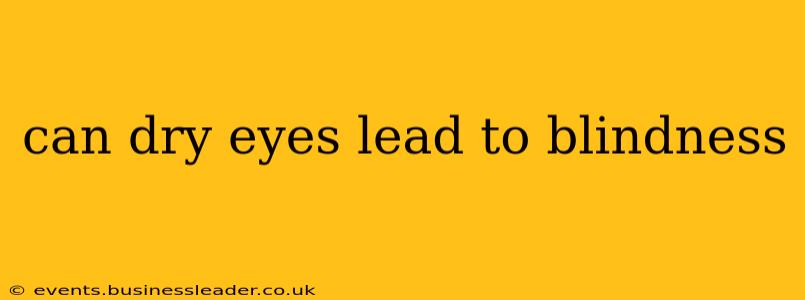Can Dry Eyes Lead to Blindness? Understanding the Risks and Prevention
Dry eye disease, a common condition affecting millions, is characterized by insufficient lubrication and moisture on the surface of the eye. While it's not directly a cause of blindness, the persistent dryness and irritation can lead to complications that, if left untreated, might compromise vision. This article will explore the relationship between dry eyes and blindness, addressing common concerns and providing valuable information.
Can dry eye syndrome cause blindness?
No, dry eye syndrome itself does not directly cause blindness. However, severe, long-term, untreated dry eye can lead to serious complications that could potentially affect your vision significantly. The chronic inflammation and damage to the cornea (the clear front part of your eye) from persistent dryness are the main concerns.
What are the potential eye problems associated with dry eyes?
Several eye problems can arise from untreated dry eyes:
- Corneal abrasions: The lack of lubrication makes the cornea vulnerable to scratches and abrasions, leading to pain, blurred vision, and potential infection.
- Corneal ulcers: Severe dryness can lead to the development of corneal ulcers, which are open sores on the cornea that require immediate medical attention to prevent scarring and vision loss.
- Dry eye-related conjunctivitis: Inflammation of the conjunctiva (the membrane lining the inside of the eyelids) can occur, further exacerbating discomfort and potentially leading to other complications.
- Reduced visual acuity: While not blindness, persistent dryness can lead to blurred or fluctuating vision as the cornea becomes damaged and irregular.
- Eye infections: A dry eye makes the eye more susceptible to bacterial or viral infections, which, if severe, can damage the cornea and impact vision.
What are the symptoms of severe dry eye disease?
Severe dry eye disease often presents with more pronounced symptoms than mild cases. These may include:
- Persistent burning or stinging sensation: This is often significantly worse than the mild discomfort experienced in milder forms of dry eye.
- Excessive tearing: Ironically, severe dryness can trigger excessive tearing as the body tries to compensate for the lack of lubrication. This "reflex tearing" is often watery and does not effectively moisturize the eye.
- Mucus discharge: Thick, sticky mucus can accumulate on the eyelids and lashes, further irritating the eyes.
- Light sensitivity (photophobia): The damaged corneal surface is often more sensitive to light.
- Blurred vision: This can fluctuate, and is a sign that the cornea is affected.
- Foreign body sensation: A persistent feeling that something is in the eye.
How is dry eye treated?
Treatment for dry eye aims to alleviate symptoms, reduce inflammation, and prevent further damage. Options include:
- Artificial tears: These over-the-counter lubricating drops provide temporary relief.
- Prescription eye drops: These often contain medications to reduce inflammation or stimulate tear production.
- Punctal plugs: Small plugs inserted into the tear ducts to slow tear drainage and keep the eye surface moist.
- Warm compresses: Applying warm compresses can help stimulate tear production and alleviate discomfort.
- Lid hygiene: Regularly cleaning the eyelids can help remove debris and reduce inflammation.
- Lifestyle changes: Avoiding dry environments, using a humidifier, and taking frequent breaks from screen time can all help.
Can I prevent dry eye from leading to more serious complications?
Absolutely. Regular eye exams, prompt treatment of dry eye symptoms, and following your ophthalmologist's recommendations are crucial. Addressing dry eye early can often prevent serious complications.
Disclaimer: This information is intended for general knowledge and informational purposes only, and does not constitute medical advice. It is essential to consult with an ophthalmologist or optometrist for diagnosis and treatment of dry eye or any other eye condition. They can assess your specific situation and recommend the best course of action to protect your vision.
